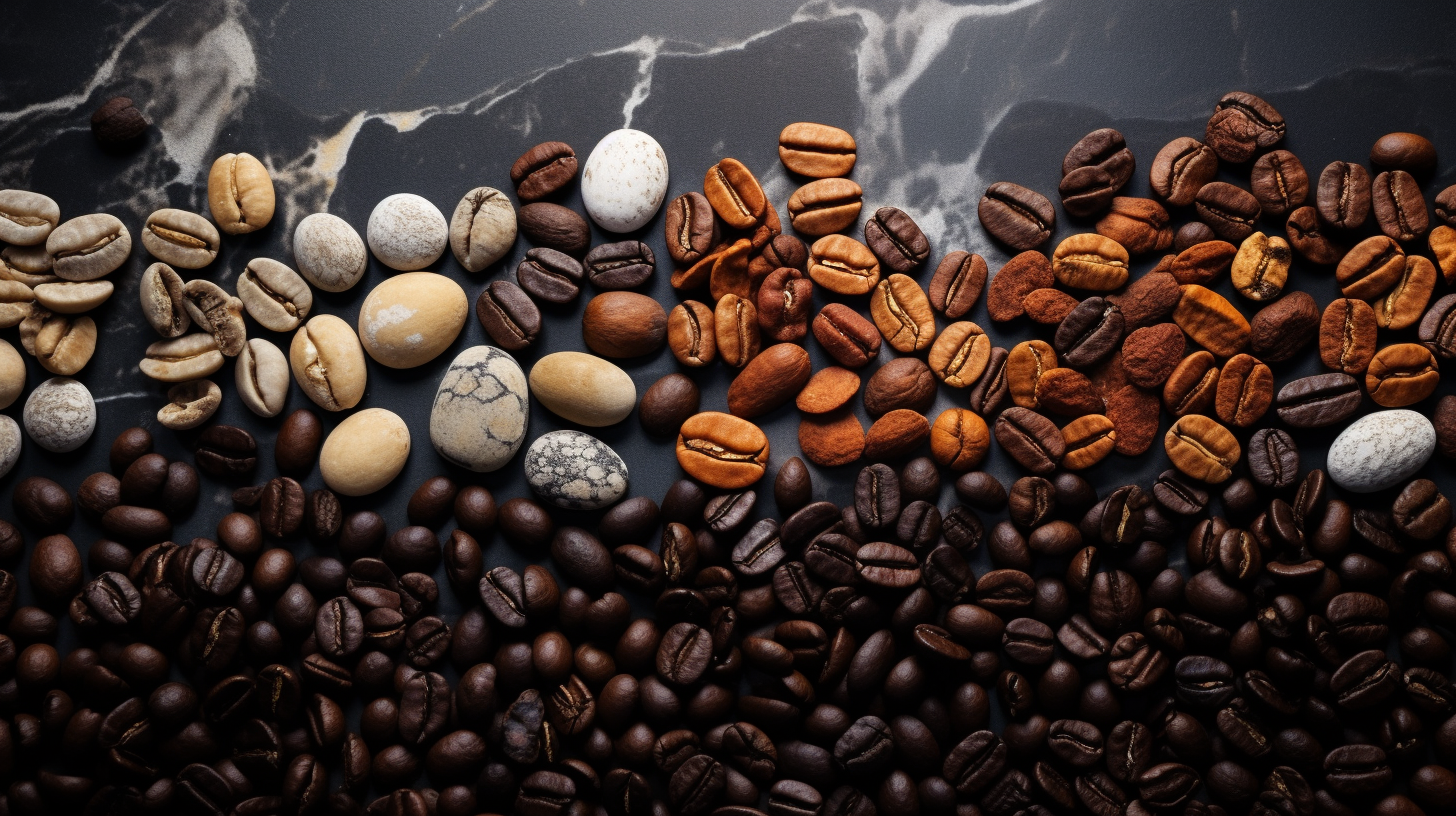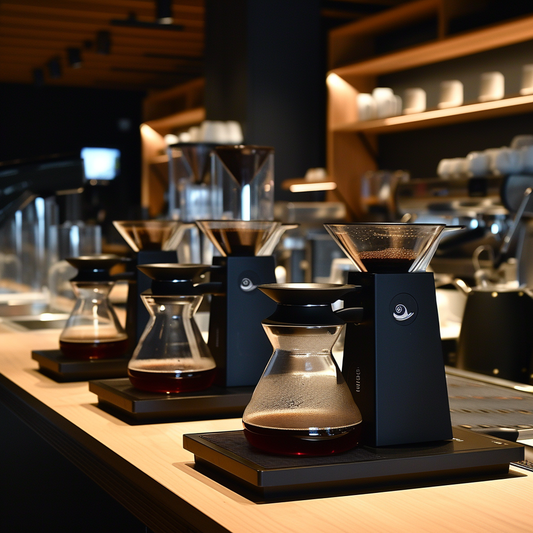That morning cup of coffee isn't just a daily ritual - it's liquid inspiration that can boost your creative thinking and problem-solving skills. Research shows caffeine can have powerful effects on brain function to help you come up with innovative ideas and solutions.
Whether you're a writer searching for the perfect metaphor, an artist looking to break creative blocks, or an creative entrepreneur ideating a new product, coffee may be just the muse you need. In this article, we'll explore the science-backed connections between caffeine and enhanced creativity, offering coffee and creativity tips along the way.
How Caffeine Affects the Brain
Caffeine is a well-known stimulant that acts on the central nervous system. Its primary mechanism of action is blocking adenosine receptors in the brain. Adenosine is a neurotransmitter that builds up over the day and induces drowsiness. By inhibiting adenosine, caffeine counteracts this sleep-promoting effect.
With adenosine suppressed, other key neurotransmitters are disinhibited and become more active. Specifically, caffeine boosts levels of dopamine and norepinephrine:
-
Dopamine is critical for motivation, reward-seeking behavior, and feelings of pleasure. Higher dopamine translates to an energized drive to accomplish goals.
-
Norepinephrine increases vigilance, reaction time, and focus.
Together, these neurotransmitters produce a stimulated mental state.
Studies utilizing electroencephalography (EEG) to visualize brain waves have shown that caffeine generates faster beta wave activity. Beta waves are associated with being mentally alert and engaged. How might this stimulation of the brain relate to creativity? The dopamine rush could motivate free-flowing creative thinking. Norepinephrine-induced focus could allow sustained attention on creative tasks. By exciting the brain, caffeine may support the cognitive processes integral to imagination and innovation. However, excessive stimulation may be counterproductive, so moderation is key. The complex interplay between caffeine and neurochemistry has intriguing implications for harnessing mental energy in creative work.
How does this stimulation of the brain translate to creativity?
The Impact on Creative Thinking and Innovation

While caffeine doesn't necessarily make you more intelligent, it does appear to enhance some types of creative thinking and problem solving.
Research has shown people who consume caffeine demonstrate:
- Increased verbal fluency - Ability to generate creative words, phrases, and expressions
- Better divergent thinking - Able to ideate more unique solutions to open-ended problems
- Improved memory - Recall more bits of information to synthesize new ideas
Caffeine allows you to make new connections between concepts you already have stored in your brain. It may also help you overcome mental blocks when you feel stuck on a creative project.
Multiple studies have linked moderate caffeine intake from coffee or tea to increased workplace innovation. The stimulant effect can boost energy, motivation, and focus for imaginative work.
Optimizing Your Coffee for Creativity
Want to design your perfect creative thinking coffee? Here are some coffee and creativity tips:
Choose your optimal caffeine dose - Too much can cause jitters, while too little won't provide a creativity boost.
- Add cinnamon for blood flow - Improves circulation which nourishes the brain.
- Try coffee alternated with green tea - Provides L-theanine amino acid to balance caffeine jitters.
- Set a positive environment - Sip coffee somewhere inspiring to you before a creative session, enhancing both creativity and coffee and mood.
- Stay hydrated - Drink water between caffeinated beverages to avoid dehydration.
Opt for organic coffee. Some research has found that organic coffee contains higher levels of antioxidants compared to conventionally grown coffee. Antioxidants support cognitive functions like focus, memory, and problem-solving ability - all important for creativity.
The pesticides used in conventional farming have also been linked to potential negative health effects. By choosing USDA Certified Organic coffee, you can boost your antioxidants intake and avoid potential pesticide residues to give your creative juices the best environment.
The next time you need a creative jolt, don't just reach for another cup of coffee - be intentional about optimizing your brew to take your innovations to the next level. With the right caffeine strategy, you may find coffee is the key to unlocking your most groundbreaking ideas.
The Role of Caffeine Across Professions
Interestingly, the effects of coffee on creativity may depend in part on your profession.
For more analytical roles, moderate caffeine doses are ideal. Too much can lead to scattered thinking. But a little boost can help make new connections. Scientific research and programming are examples.
For more creative roles like artists, designers, and writers, higher caffeine intake may enhance imaginative thinking even further. It may help tap into more abstract concepts.
And for entrepreneurs or business roles, caffeine can provide the sustained energy and focus needed for innovative problem solving. The elevated dopamine and norepinephrine can increase motivation.
So while coffee benefits creative thinking in general, the ideal amount may differ based on the type of work you do.
Caffeine for Innovative Problem Solving
Caffeine doesn't just spark imaginative ideas - it can also help you solve problems innovatively. The increased focus and vigilance sharpens critical thinking and logic needed to troubleshoot issues.
Here are some examples of how a moderate caffeine boost can enhance innovative problem solving across different fields:
- Scientists: See connections between findings that lead to novel hypotheses
- Engineers: Combine knowledge in new ways to design innovative products or processes
- IT professionals: Ideate creative new software features and troubleshoot code bugs
- Business leaders: Brainstorm imaginative solutions to improve operations, lower costs
- Entrepreneurs: Design inventive products, services, or business models
- Marketers: Devise unconventional ad campaigns that capture consumer attention
- Educators: Invent new teaching methods to better explain complex topics
- Manufacturing: Streamline production processes through inventive workflow optimization
No matter your profession, consuming coffee strategically can provide the mental boost to devise creative solutions. The stimulated neurotransmitters increase your ability to synthesize information and conquer problems intelligently.
Risks of Too Much Caffeine
While caffeine can spark creativity in moderate amounts, too much can have detrimental effects.
Drinking more than 400mg of caffeine per day may increase feelings of anxiety, restlessness, insomnia and stomach irritation. Extremely high intakes can cause tremors, headaches, and impaired brain function.
Too much caffeine late in the day can disrupt sleep, which impairs cognitive performance and creative thinking the next day. Always aim for your last coffee no later than early afternoon.
Dependency on excessive caffeine also leads to cycles of crashes as levels spike and drop rapidly in your bloodstream.
To maximize the creative benefits of coffee, opt for the smallest dose that provides an energizing boost without negative side effects.
Coffee and Creativity Breaks

For an optimal creativity boost, strategically schedule coffee breaks rather than continuously sipping caffeine all day long.
Use coffee as a tool prior to creative sessions or when tackling challenging problems requiring innovative solutions. Then take breaks from caffeine while doing more analytical work.
Alternating coffee and water allows your adrenal glands to reset. You can avoid building up a tolerance where caffeine loses its stimulating effects.
Time your coffee intake around periods of the day when you need to be the most imaginative and energized. The strategic caffeine boosts will stretch your creative thinking skills.
Sip, Think, Innovate: The Power of Coffee in Creativity
Coffee and creativity have a linked relationship grounded in science. The caffeine in coffee serves as a stimulant that enhances key areas of the brain involved in creative thinking, ideation, innovative problem-solving, and even influencing coffee and mood.
While too much caffeine can cause impairment, small to moderate amounts can boost verbal fluency, memory, and divergent thinking on imaginative tasks.
By being intentional about when and how much coffee you drink, you can leverage caffeine's creativity-enhancing effects based on your profession and the work you want to accomplish. Use coffee as a strategic tool to think more imaginatively and uncover innovative solutions!






